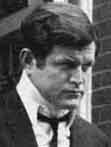-1-
- Having made his mark on Hollywood and Wall Street, Joe came to realize that Washington was where the real power was. Joe had never been interested in the arduous way his father had achieved political power - through meetings in smoke-filled rooms and holding constituents' hands. Rather, now that he was one of the richest men in the country, Joe would simply buy his way into power.
- Joe Kennedy's entry into politics began when a mutual friend arranged a meeting between Kennedy and then-governor of New York Franklin Roosevelt. Having just won reelection as governor, Roosevelt was already being described as a contender for President. A pragmatist willing to obtain support from almost any quarter, he saw Joe Kennedy as both a potential source of major campaign contributions and someone who could swing Wall Street and conservative Democrats his way.
- At their meeting, Kennedy and Roosevelt forged a political alliance. Joe would contribute to his campaign and open doors to him on Wall Street; Roosevelt would bring Joe into his inner circle of advisers, and include him in his cabinet. |
-2-
- Once the campaign got under way, Joe not only contributed large sums of money directly to Roosevelt, but he also became Roosevelt's "money collector" or bag man, collecting cash from those who wanted to hide their identities.
- Joe was of further value to Roosevelt because of his close relationships with many newspaper publishers who could be critically important to an election. Not only could they support candidates in their papers, they often used their political clout to choose candidates in the first place. Chief among these media power brokers was Kennedy's friend William Randolph Hearst.
- Hearst owned 33 newspapers with a circulation of 11 million. He also controlled 86 delegates to the Democratic nominating convention, nearly all from the critical states of California and Texas. In a last minute move, Kennedy persuaded Hearst to back Roosevelt. Hearst not only provided a large campaign contribution, but he also swung his delegates to Roosevelt. Joe would later claim, justifiably, that he had won the nomination for Roosevelt. |
-3-
- More than a year after Roosevelt was elected President, Kennedy was still without his promised cabinet post.
- In June 1934, the Securities and Exchange Commission (SEC) was created, and Roosevelt appointed Joe Kennedy chairman. The appointment drew strong criticism from those who felt that Joe Kennedy symbolized everything the SEC had been set up to eradicate. Roosevelt, however, stood firm, telling one advisor that it "took a thief to catch a thief." Roosevelt also knew that Joe's financial backing had been critical to his election, and he hoped that giving Kennedy the SEC chairmanship would secure his financial support for the next election as well.
- The SEC, under Joe's direction, went on to outlaw most of the practices that had made Kennedy rich, including a ban on short selling, one of Joe's favorite ways of making money.
- For nearly two years, a parade of Wall Street titans would march to the witness stand and describe their roles in the seamy dealings. But while records of Joe's unethical transactions were presented during the hearings, Joe was never called to appear. Joe would later pretend that he was innocent of any wrong-doing.
- In his book I'm for Roosevelt, Joe wrote, "For month after month the country was treated to a series of amazing revelations which involved practically all the important names in the financial community in practices which, to say the least, were highly unethical."
- Kennedy's condemnation of his former business associates came as little surprise to anyone. Joe was known both for discarding friends when they had served their purpose and for knifing in the back those who had helped him. As one Wall Street colleague said, "I don't know why Joe Kennedy turned on me - I never did anything to help him."
- If one of Joe's failings was his lack of loyalty to those who had helped him, he now turned that trait to his advantage. He did not care if his former cohorts hated him because of his enforcement efforts. Joe had ambitions for himself and his sons that transcended the SEC. This would be a way for him to make a name for himself and for his family.
- Joe would later describe his work at the SEC as "forcing their mouths open and going in with a pair of pincers and just taking all the gold out of their teeth."
- Joe Kennedy resigned from the SEC in September 1935. |
-4-
- In 1937, Kennedy began hinting to Roosevelt that he still "deserved a reward" for his role in the election. Roosevelt, who had become mistrustful of Kennedy, chose not to give him a cabinet post and instead appointed him ambassador to England.
- Kennedy's ambassadorship coincided with the beginning of World War II in Europe; and throughout his three year tenure, Kennedy argued against American and British involvement in the war. Even as the Nazis rolled into France, Joe expressed his support for Hitler and maintained a position of appeasement toward Germany.
- In May 1940, Winston Churchill was elected British Prime Minister. The rise of Churchill brought an end to appeasement, and hastened Joe's decline. When Kennedy publicly proclaimed that "Democracy is finished in England," Roosevelt called for his resignation.
- Harvey Klemmer, who had been Kennedy's speech writer in London, would later complain that Joe had often given him assignments that were completely unrelated to his job. Besides spending inordinate amounts of government time securing precious cargo space for Joe's whisky shipments, he had also been expected to provide Joe with young women. One was a former French model known as "Foxy". |
